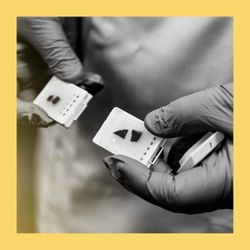Share

Babbage from The Economist
Learn about the latest innovations and discoveries in science and technology.
Latest episode

Science is winning the war on cancer
40:21|The rates of deaths from cancer have fallen dramatically in recent decades. And the good news doesn’t stop there. By teasing out the reasons why some cancers take hold, while others don’t, scientists are opening up new ways to prevent even more cases of the disease. Guests and hosts:Slavea Chankova, The Economist’s health-care correspondentJoanna Fowler, senior staff scientist at the Wellcome Sanger InstitutePhil Jones, an oncologist at the University of Cambridge and the Wellcome Sanger Institute Alok Jha, host of “Babbage”Topics covered:Cancer researchTumour preventionCarcinogensTranscripts of our podcasts are available via economist.com/podcasts.Listen to what matters most, from global politics and business to science and technology—subscribe to Economist Podcasts+.For more information about how to access Economist Podcasts+, please visit our FAQs page or watch our video explaining how to link your account.
More episodes
View all episodes

How to think like a chess pro
34:36|How do the world’s best chess players operate? What does the game itself reveal about thinking and memory? In this episode, Jennifer Shahade explains how thinking like a chess champion can help you make better decisions in life.Guests and hosts:Jennifer Shahade, Woman Grandmaster and author of “Thinking Sideways”Alok Jha, host of “Babbage”You can watch Alok and Jennifer play their chess game here.Topics covered:ChessCognitive scienceArtificial intelligenceTranscripts of our podcasts are available via economist.com/podcasts.Listen to what matters most, from global politics and business to science and technology—subscribe to Economist Podcasts+.For more information about how to access Economist Podcasts+, please visit our FAQs page or watch our video explaining how to link your account.
Can “world models” fix AI’s blind spots?
42:04|Modern artificial intelligence is seemingly unstoppable. But large language models have an undeniable blind spot: an incomplete understanding of physical reality and the laws of physics. Could “world models” be the solution—and how are AI labs building them?Guests and hosts:Alex Hern, AI writer at The EconomistYann LeCun, AI pioneer and executive chairman at AMI LabsShlomi Fruchter, research director at Google DeepMindCristóbal Valenzuela, CEO at Runway AIAlok Jha, host of “Babbage”Topics covered:Large language modelsWorld modelsGoogle's Project GenieTranscripts of our podcasts are available via economist.com/podcasts.Listen to what matters most, from global politics and business to science and technology—subscribe to Economist Podcasts+.For more information about how to access Economist Podcasts+, please visit our FAQs page or watch our video explaining how to link your account.
NASA’s Artemis: humans are returning to the Moon
38:29|NASA’s much-delayed Artemis II mission is set to launch in early March. For the first time since 1972, astronauts will fly around the moon—if all goes well, that means humans could walk on the lunar surface once again in a subsequent mission. But, if China succeeds in its own ambitions, those astronauts might not be alone. A new Moon race has begun.Host: Alok Jha, The Economist’s science and technology editor. Guests: The Economist’s Tim Cross and Oliver Morton; and Teasel Muir-Harmony of the Smithsonian's National Air and Space Museum.For more on America’s Moon programme, listen to our podcast on the inception of NASA’s giant (and pointless) SLS rocket.Transcripts of our podcasts are available via economist.com/podcasts.Listen to what matters most, from global politics and business to science and technology—subscribe to Economist Podcasts+.For more information about how to access Economist Podcasts+, please visit our FAQs page or watch our video explaining how to link your account.
Jimmy Wales: Wikipedia’s founder on surviving AI
40:25|Wikipedia, a volunteer-written encyclopedia, has defied the odds to become one of the world's most popular—and trusted—websites. Today, the project is under threat from divisive politics and the rise of generative AI. But Jimmy Wales, Wikipedia’s resilient founder, argues that the encyclopedia—and the human values which underpin it—are more relevant than ever.Host: Alok Jha, The Economist’s science and technology editor. Guests: Andrew Palmer, host of The Economist’s “Boss Class” podcast; and Jimmy Wales, founder of Wikipedia and the author of “The Seven Rules of Trust: Why It Is Today's Most Essential Superpower”.Andrew’s new series of “Boss Class”, which explores how to master management in the age of AI, is out on January 29th.Transcripts of our podcasts are available via economist.com/podcasts.Listen to what matters most, from global politics and business to science and technology—subscribe to Economist Podcasts+.For more information about how to access Economist Podcasts+, please visit our FAQs page or watch our video explaining how to link your account.
Trailer: Boss Class Season 3
02:18|AI is changing how we work. It's turning us all into managers. Be a good one.The Economist’s management columnist, Andrew Palmer, takes on the bots in the third season of Boss Class. From cloning to coding, agents to entry-level jobs, he tackles the threat head on and figures out how to turn anxiety into opportunity. Along the way he meets bulls and bears and the people who can help you to master management in the age of AI.Full Season 3 out 29th January 2026.To listen to the full series, subscribe to Economist Podcasts+.https://subscribenow.economist.com/podcasts-plusIf you’re already a subscriber to The Economist, you have full access to all our shows as part of your subscription. For more information about how to access Economist Podcasts+, please visit our FAQs page or watch our video explaining how to link your account.
Custom cures: tailor-made drugs for rare diseases
42:27|A teenage girl in Britain recently received a custom-made drug to fix a fault in her genetic code. Doctors hope that it will treat her ultra-rare neurodegenerative condition. It is also part of a medical trial that could transform the way that customised medicines are made available to people who otherwise have no alternatives. Host: Alok Jha, The Economist’s science and technology editor. Guests: Natasha Loder, The Economist's health editor; Julia Vitarello of EveryONE medicines; Paul Gissen of UCL Great Ormond Street Institute of Child Health.Transcripts of our podcasts are available via economist.com/podcasts.Listen to what matters most, from global politics and business to science and technology—subscribe to Economist Podcasts+.For more information about how to access Economist Podcasts+, please visit our FAQs page or watch our video explaining how to link your account.